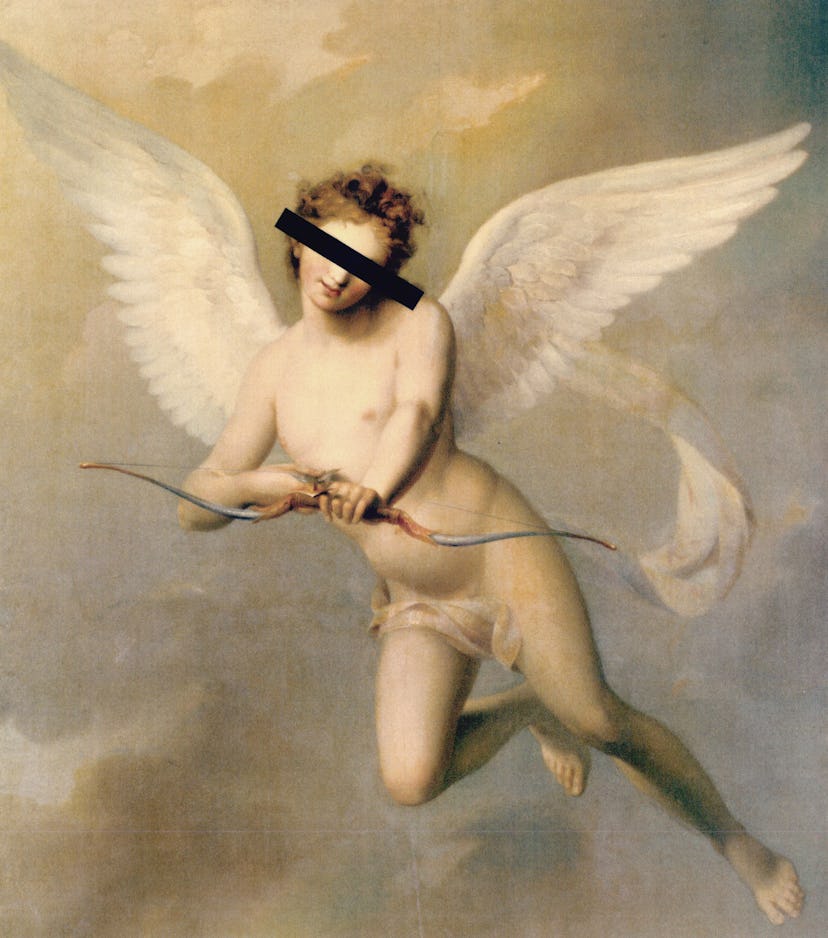Chatter about Love Is Blind, a Netflix reality show where six couples consider getting engaged, sight unseen, after less than a week of isolated conversation, is impossible to escape. The premise is so twisted, so deeply cursed, it quickly produced a storm of memes and social-media debate. Another unavoidable Netflix show. Resistance is futile.
Voyeurism, especially of the lowbrow variety, is a powerful force that has proven to attract, well, most everyone I know. Shows like this provide professionally crafted, but still somewhat realistic, insight into how society at large handles big topics: love, gender, race, sexuality, and privilege. It seems that we all want to see generally attractive people from tertiary markets look for love, followed by immediate nuptials in a public forum.
Watching strangers get to know one another, even while multiple cameras roll, is fascinating. Among these bland but passable contestants, there is an undeniable pressure to woo this new shadow, to charm and find intense intimacy at a breakneck pace. Surely the editing helps. Regardless, seeing these people search for common ground (through a wall) while drinking red wine in a prom dress or pajamas makes for captivating television.
But unlike on a lot of other shows in this category, the couples on Love Is Blind seem, dare I say, genuine. The adventure of it all and the prospect of finding someone to marry appears to be more of a driving force than the guaranteed flash-in-the-pan fame or possible future as a low-level influencer. There are no winners or monetary prizes. Fighting, drinking, and fucking—the reality show Holy Trinity—are ever present, but these people seem to be driven by the search for a life partner. They are grotesquely earnest.
And their desperate search for love also reflects how far we are sometimes willing to go in real life. Feeling a kinship with a stranger because he likes the same baseball team and goes to church seems crazy, but how different is it from agreeing to get a drink with someone you’ve been chatting with on an app for 20 minutes?
Maybe the idea of marriage as the ultimate goal isn’t as passé as we think. Lots of my friends are married or are getting married soon. I was married for a while myself! When things feel out of control, marriage can be empowering. The concept of taking the reins of one’s destiny and declaring a choice seems almost modern.
The author and podcast host Lara Marie Schoenhals and the culture writer Raven Smith are just two of the millions of people who have tuned in to watch Love Is Blind. On the subject of marriage being an act of autonomy, Schoenhals disagrees. “You have to be kind of delusional to believe in the concept of marriage, because hitching your wagon to another person for the rest of your life requires taking a staggering leap of faith and a fair amount of willful ignorance,” she says. But If nothing is guaranteed, then what do we have to lose? These normies are seeking love in an absurd way, but it’s only a few notches crazier than Raya, with fewer Australian photographers and “models” in the mix.
“The deeper and more resonant element to Love Is Blind is how often the people on the show are willing to ignore obvious red flags—like knowing full well that you’re someone’s backup engagement option, or, worse, having no idea what truffle salt is—because their desire to get married outweighs their desire to act in their own best interests,” Schoenhals explains. “The more insane the relationship journeys are, the more relatable they become.”.
Smith, meanwhile, thinks the romance is lost, but the entertainment is not. “It’s fundamentally flawed to think you can build a foundation for foreverness in 40 days,” he says. The absence of logic is not lost on him, “It’s a kind of spectacle to watch them suspend disbelief. We’re all waiting for their logical thinking to kick in, but they’re hypnotizing each other with this ominous mantra of ‘get out of your head/start using your heart,’ ” he says. “It’s not romantic to see them swerve around rationality, but it’s hideously entertaining.”
So as we sit in our smartly appointed coastal living rooms roasting a henley-wearing scientist for his rapping, a short fitness instructor for being desperate, and a 30-something blonde for being age gap–obsessed, I think we also see something familiar in them. At its core, the need to love and be loved is relatable, no matter how it’s packaged. Perhaps this is why so many are drawn to an utterly fascinating but fundamentally mind-numbing show like Love Is Blind. Because love is, in fact, all-seeing, and we all want to find it.
